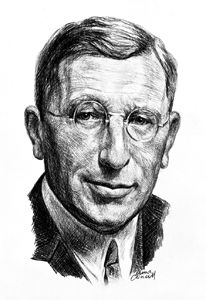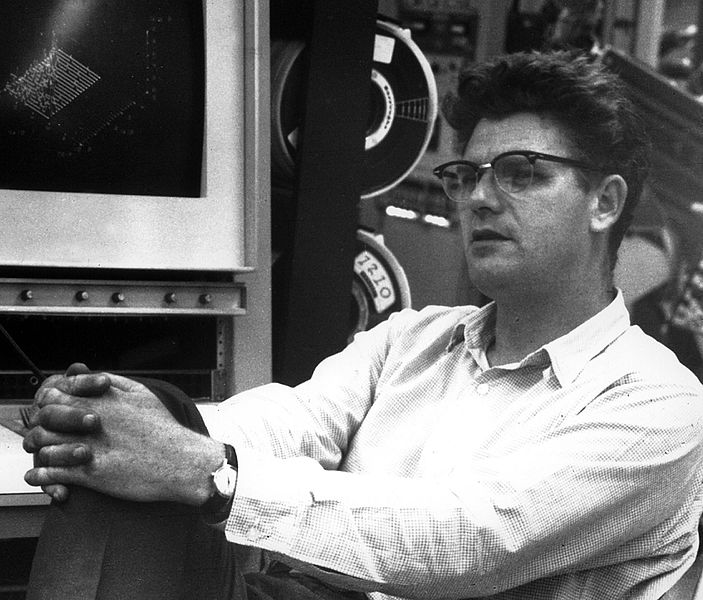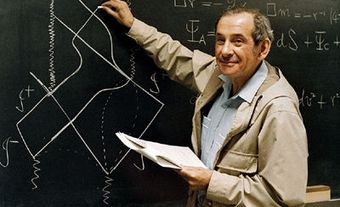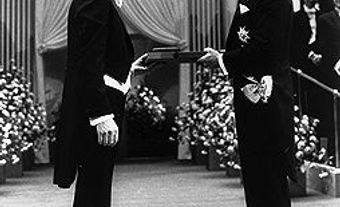The Nobel Prizes are awarded annually for achievements that have significantly benefitted humankind. The prizes are among the highest international honours and are awarded in six categories: physics, chemistry, physiology or medicine, literature, peace, and economics. They are administered by the Nobel Foundation and awarded by institutions in Sweden and Norway. Eighteen Canadians have won Nobel Prizes, excluding Canadian-born individuals who gave up their citizenship and members of organizations that have won the peace prize.

How Was the Nobel Prize Created?
In his will, the Swedish inventor of dynamite, Alfred Nobel (1833–96), instructed his executors to establish five prizes. These honours would reward positive contributions to humanity in physics, chemistry, physiology or medicine, literature, and peace. The Nobel Foundation was set up in 1900 to carry out this mission and gave out the first prizes the next year. The foundation awarded the original five prizes annually until 1969, when the Swedish state bank endowed a sixth prize for economics.
Nobel Prizes consist of a medal and a cash award. Although the cash value (set in Swedish kronor) varies, prizes have been worth more than 1 million Canadian dollars in recent years. Two or three winners often share a prize, and the peace prize can go to organizations as well as individuals.
What Is the Selection Process?
Many people can nominate candidates, including university professors, scientists, parliamentarians and previous Nobel winners. Individuals cannot nominate themselves.
Did you know?
The Nobel Foundation keeps the names of Nobel Prize nominees and nominators secret from the public for 50 years. During this time, it also withholds details on the “investigations and opinions” involved in the selection process.
Nobel Prize Committees within four different institutions select winners from the nominees. The Royal Swedish Academy of Sciences awards the prizes for physics, chemistry and economics. The Swedish Academy, an independent cultural institution, awards the literature prize. The Nobel Assembly at Karolinska Institutet, a Swedish medical university, awards the prize for physiology or medicine. The Norwegian Nobel Committee (appointed by Norwegian parliament) awards the peace prize.
Nobel Prize in Physics: Canadian Winners
Six Canadians have won the Nobel Prize in Physics. The first was Richard E. Taylor, who shared the 1990 prize with Americans Jerome I. Friedman and Henry W. Kendall for their work at Stanford University developing the quark model in particle physics.
Bertram Brockhouse shared the 1994 physics prize with American Clifford G. Shull. Brockhouse earned his half for the development of neutron spectroscopy.
In 2009, Willard S. Boyle and George E. Smith shared the prize with Charles Kuen Kao, a dual British-American citizen. Boyle and Smith were honoured for their 1969 invention of the charge-coupled device (CCD), which transforms patterns of light into useful digital information. The CCD is widely used in modern digital cameras and is an important component of telescopic devices such as the Hubble Space Telescope.
Arthur B. McDonald shared the 2015 physics prize with Takaaki Kajita of Japan. They discovered that neutrinos — one of the smallest particles of matter — have mass. Neutrinos were previously thought to be massless. According to the Royal Swedish Academy of Sciences, “the discovery has changed our understanding of the innermost workings of matter.”
In 2018, Donna Strickland shared the prize with Gérard Mourou of France and Arthur Ashkin of the United States. Strickland and Mourou, her doctoral supervisor, won for developing high-intensity, ultrashort bursts of laser light. This technology is used in eye surgeries and in the production of small medical devices.
James Peebles took one half of the 2019 prize. Swiss colleagues Michel Mayor and Didier Queloz split the other half. The Nobel committee cited Peebles’ “theoretical discoveries in physical cosmology.” Beginning in the mid-1960s, Peebles developed a theoretical framework that underlies much of what physicists understand about the universe today (see Cosmology).
Nobel Prize in Chemistry: Canadian Winners
Five Canadians have won the Nobel Prize in Chemistry. The first was Gerhard Herzberg, who earned the 1971 chemistry prize for his research on the structure of molecules. His work focused on free radicals, smaller parts of molecules that break away during chemical reactions.
Henry Taube won the 1983 prize for advancing scientists’ understanding of electron transfers in metal complexes.
In 1986, John Polanyi shared the chemistry prize with Taiwanese Yuan T. Lee and American Dudley R. Herschbach. Each studied the dynamics of chemical reactions. Polanyi earned his share of the award for developing a method of mapping chemical reactions by measuring the weak infrared radiation they emit.
Sidney Altman, a dual citizen of Canada and the United States, shared the 1989 prize with American Thomas Cech. They discovered that the genetic material RNA can act as a biocatalyst or enzyme.
In 1993, Michael Smith shared the prize with American Kary Mullis for developing a crucial technique used in genetic engineering called site-directed mutagenesis. The discovery allows researchers to better understand how cancer and virus genes work.
Nobel Prize in Physiology or Medicine: Canadian Winners

Three Canadians have won the Nobel Prize in Physiology or Medicine. The first two went to Frederick Banting and J.J.R. Macleod in 1923 for the discovery of insulin.
In 1981, David Hubel shared the prize with Swedish-born Torsten Wiesel for their ground-breaking work on the mapping of the brain’s visual cortex.
Nobel Prizes in Literature: Canadian Winners
Alice Munro won the Nobel Prize for Literature in 2013 for her mastery of the short story. Munro’s win prompted some debate about whether she or Saul Bellow was the first Canadian to win the literature prize. Commentators have suggested that Montreal-born Bellow, who won the 1976 prize, would have given up his Canadian citizenship when he became a US citizen in 1941. (At that time, few Americans could hold dual citizenship.)
Nobel Peace Prize: Canadian Winners
Nobel Peace Prizes are more explicitly political; they have been awarded to institutions such as the Red Cross and UNICEF, as well as to individuals.
Lester B. Pearson won the Nobel Peace Prize in 1957 for diplomatic solutions to the Suez Crisis of 1956.
Half of the 1995 Nobel Peace Prize went to the Pugwash Conferences on Science and World Affairs, a series of meetings of scientists and decision-makers founded in Pugwash, Nova Scotia, in 1957. The focus of these conferences was to reduce the role of, and eventually eliminate, nuclear arms. (See Pugwash Wins Nobel Prize.)
In 1999, James Orbinski, president of the International Council for Médecins Sans Frontières (Doctors Without Borders), accepted the prize on behalf of that organization.
Half of the 2007 peace prize went to United Nations Intergovernmental Panel on Climate Change, on which climate scientist Andrew Weaver served as one of the lead authors.

Nobel Prize in Economics
The economics prize is not one of the five prizes endowed by Alfred Nobel. Officially called the Sveriges Riksbank Prize in Economic Sciences in Memory of Alfred Nobel, it was funded by the Swedish state bank in Nobel’s memory long after his death. Nevertheless, it is informally referred to as the Nobel Prize in Economics because the Royal Swedish Academy has awarded it annually with the other science prizes since 1969. Three of its laureates were born in Canada and later became Americans: William Vickrey (1996), Robert Mundell (1999) and Myron Scholes (1997). A 1999 profile of Mundell by Maclean’s magazine reported that he was still a Canadian citizen.
Canadian-born labour economist, David Card took one half of the Nobel Prize in Economics in 2021. The other half of the prize was jointly awarded to Joshua Angrist and Guido Imbens. David Card, received the prize for his research on the impacts minimum wage, immigration and education have on the labour market.
Questions of Nationality
There are many cases in which Nobel Prize winners have lived or worked in more than one country. As a result, it is not always clear which nations can reasonably “claim” Nobel laureates as their own. Canada has several examples of debatably “Canadian” Nobel wins, in addition to those already mentioned in relation to the literature and economics prizes.
Canadian-born chemists William Giauque (1949 prize) and Rudolph Marcus (1992 prize) spent their careers in the United States and became American citizens at a time when dual citizenship was not available to most. They likely gave up their Canadian citizenship in the process. Marcus is, however, a Foreign Fellow of the Royal Society of Canada.
Two Canadian-born laureates of the Nobel Prize in Physiology or Medicine, Charles Huggins (1966) and Ralph Steinman (2011) similarly became naturalized US citizens and were affiliated with American institutions throughout most of their careers. British-born Jack Szostak (2009) spent part of his youth and education in Canada and later adopted US citizenship.
Politics and Controversies
Nobel Prizes became political as early as 1936, when a peace prize was awarded to Carl von Ossietzky, a German citizen then in a concentration camp. Adolf Hitler decreed that no German should accept a Nobel Prize. Three German scientists who were forced to decline prizes in 1938 and 1939 received their medals (but not the cash) after the Second World War. Authorities in the Soviet Union forbade Boris Pasternak from accepting the 1958 Nobel Prize in Literature. Burmese politician Aung San Suu Kyi and Chinese human rights activist Liu Xiaobo were both political prisoners when they won the peace prize in 1991 and 2010, respectively.
Two people have refused Nobel Prizes: Jean-Paul Sartre of France (literature, 1964) and Le Duc Tho of Vietnam (peace, 1973). Nobel Prizes for science are generally considered nonpolitical, and none have been refused. They have not been free from controversy, however, especially in cases where multiple scientists have contributed to a discovery. The discovery of insulin in Canada is one such case.

The Nobel Prize in Literature is awarded on more subjective grounds than those for science (where research citations indicate an individual’s worldwide reputation). Alfred Nobel willed that the literature prize to go to “the most outstanding work in an ideal direction,” regardless of the writer’s nationality. However, the Swedish Academy has long received criticism for awarding most of the prizes to European writers. In 1984, the organization admitted that the lack of global representation was a problem. While it has since made greater efforts “to achieve a global distribution,” claims that the prize was too Eurocentric persisted into the 2000s. Women are also vastly underrepresented among winners of the literature prize, making up less than 15 per cent of the list.
The 2018 Nobel Prize in Literature was postponed when 18 women brought forward allegations of sexual assault against Jean-Claude Arnault, the husband of Swedish Academy member Katarina Frostenson. Several of the alleged assaults reportedly occurred on the Swedish Academy’s property. Frostenson was removed from the committee.

 Share on Facebook
Share on Facebook Share on X
Share on X Share by Email
Share by Email Share on Google Classroom
Share on Google Classroom









